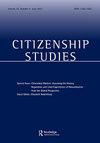Movement of internal migrants during the COVID-19 pandemic in India: Enacting embodied citizenship
IF 1.9
3区 社会学
Q3 POLITICAL SCIENCE
引用次数: 0
Abstract
ABSTRACT This article examines the distress movement of circular internal migrants working in the urban informal sector back to their home states following the country-wide lockdown in India, to contain the outbreak of the COVID-19 pandemic. It analyzes the migrant as being bodily materialized through the denial of relationality, intercorporeality and the situational experiences of their bodies, at the intersections of labour and gender. It argues that citizenship in India is substantively an embodied experience as validated by the return movement of the migrants, whose suffering bodies stood out in the public eye, in sharp contrast to rest of the citizens who stayed locked in their homes to protect themselves from the COVID-19 virus as per government order. It concludes that the movement by migrants constitutes their ‘acts of citizenship’, through which they performatively negotiated their migrant identity resisting their embodied difference by enacting themselves as political subjects.2019冠状病毒病大流行期间印度国内移民的流动:颁布体现公民身份
摘要本文研究了在印度全国封锁后,为遏制新冠肺炎疫情的爆发,在城市非正规部门工作的循环内部移民返回家乡的痛苦流动。它分析了移民在劳动和性别的交叉点上,通过否认关系性、企业间性和身体的情境体验,将其视为身体物化。它认为,印度的公民身份实质上是一种具体的体验,移民的返回运动证明了这一点,他们痛苦的身体在公众眼中尤为突出,这与根据政府命令被锁在家里保护自己免受新冠肺炎病毒感染的其他公民形成了鲜明对比。它的结论是,移民的流动构成了他们的“公民行为”,通过这种行为,他们通过将自己设定为政治主体来表现性地协商他们的移民身份,抵制他们所体现的差异。
本文章由计算机程序翻译,如有差异,请以英文原文为准。
求助全文
约1分钟内获得全文
求助全文
来源期刊

Citizenship Studies
POLITICAL SCIENCE-
CiteScore
3.60
自引率
11.10%
发文量
85
期刊介绍:
Citizenship Studies publishes internationally recognised scholarly work on contemporary issues in citizenship, human rights and democratic processes from an interdisciplinary perspective covering the fields of politics, sociology, history and cultural studies. It seeks to lead an international debate on the academic analysis of citizenship, and also aims to cross the division between internal and academic and external public debate. The journal focuses on debates that move beyond conventional notions of citizenship, and treats citizenship as a strategic concept that is central in the analysis of identity, participation, empowerment, human rights and the public interest.
 求助内容:
求助内容: 应助结果提醒方式:
应助结果提醒方式:


